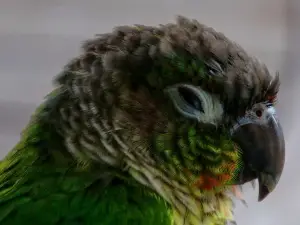
Conures are the cutest of birds, these little animals also have a very beautiful set of feathers, but these feathers can change sometimes.
This article looks into why your green cheek conure is developing black feather tips
Table of Contents
Green cheek conure black feather tips:
If your bird naturally has black feather tips then you have nothing to worry about, but if your conure’s feathers start suddenly turning black you’d be right to be worried.
If your bird’s feather tips are turning black then this usually means that the bird has a vitamin A deficiency.
It’s actually surprisingly easy for your bird to become malnourished, you can serve the bird a variety of nutrient-dense foods but this may simply not be enough.
How much food you serve your bird and how much they actually eat can be quite different.
If your birds are picky eaters then they can develop a vitamin deficiency, there is usually a difference between the food that we leave out for our birds and the food that the birds eat and this may cause them to become deficient.
Other signs of a vitamin A deficiency in your birds include fertility problems, poor ocular health, weakened immune systems, and the bird being unable to eat or drink.
What to do:
If the birds are only eating the foods that make them happy then you’d need to supplement vitamin A into your bird’s diet.
You can do this by giving the bird more vitamin A rich foods, or, give over counter supplements to your bird to ensure that the bird gets enough vitamin A.
You may want to take the bird to the vet to have them test the bird’s blood levels to see if there is actually a lack of vitamin A in the bird’s diet.
These birds may also need medical attention to treat the other symptoms linked to having a deficiency in vitamin A, the vet can help with this.
The vet will also advise on the best amount of supplements to give your bird.
How to serve vitamin A to birds
You can serve vitamins to birds through vitamin A rich foods.
Foods rich in vitamin A include mangoes, carrots, dark leafy greens, like broccoli, chard, spinach, parsley, and kale, foods like sliced pumpkin (not tinned pumpkin) dandelions, apricot, peaches, papaya yams, and sweet potatoes.
Fed these foods in their raw form, if they are not served raw, and are rather cooked, then the vitamin A will be slightly decreased due to the cooking process.
You can also feed your bird supplements.
The vitamin A supplements that you give your bird will likely come in a powder form that you can add to your bird’s food, or a liquid form.
It is recommended that if you want to use powder supplements for your bird then you moisten the powder and mix it into your bird’s food.
Avoid adding the dry powder to your bird’s food as the powder will simply fall to the bottom of the bowl and not be eaten
Liquid vitamin supplements can also be added to your bird’s water.
You can add vitamin drops to your bird’s water but make sure that you change the water daily as it can become stagnant if left for too long.
The water will also start to smell like sulfur if left out for too long, the birds will not drink this because of the smell.
Read the package instructions of how many drops to add to the water but make sure that the drops do not turn the water a dark lemon-lime color, the birds will not drink this water if it’s dark.
The water turning a slight yellow tint will be fine.
If the bird regularly drinks this water as it should then its feathers should start turning back to normal soon enough
If you enjoyed this article then you may also be interested in other bird related articles. Here are some articles that you may be interested in: Why Does My Bird Yawn When I Pet Him, Feather Bronzing Conure, Black Spots On Conure Feathers, Conure Feather Problems

